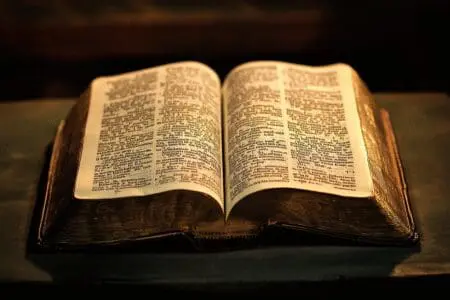The Bible can feel like a mountain. It’s a massive collection of writings—66 books, tens of thousands of verses, and over three-quarters of a million words. It’s a library, not a novel. For years, I saw it as this single, intimidating book. I’d open it randomly, read a few verses, and close it again, feeling like I’d barely taken a single step. The sheer scale was overwhelming. It wasn’t until I started to see its structure, its individual parts, that the mountain began to look more like a range of explorable peaks. That curiosity eventually brought me to a simple question: What are the longest books in the Bible?
Knowing which books are the marathon runs can help you pace yourself. It’s not about bragging rights; it’s about understanding the incredible scope and depth these monumental texts offer. So, let’s climb that mountain together and explore the five longest books in the Bible, measured by their English word count.
More in Bible Category
How Many Bible Verses Are There in the Bible
What Is the First Word in the Bible
Key Takeaways
- It’s All in How You Measure: First off, “longest” isn’t as simple as it sounds. The answer changes depending on if you’re counting chapters, verses, or words. This list uses English word count, which gives the best sense of reading time.
- The Big Winner is a Songbook: Surprisingly, the Book of Psalms, a collection of 150 poems and prayers, takes the top spot by word count, just edging out the prophet Jeremiah.
- The Prophets are Heavy Hitters: Three of the top five longest books come from the Major Prophets—Jeremiah, Ezekiel, and Isaiah. Their lengthy records of sermons and historical accounts give them their size.
- An Epic Origin Story: Genesis makes the list because of its sweeping, multi-generational story, covering everything from creation to the formation of Israel in Egypt.
- Length Has a Purpose: These books aren’t long just for the sake of it. Their size allows for deep theological ideas, complex characters, and a historical reach that shorter books simply can’t match.
But How Do We Even Measure “Longest”?
Before we start the countdown, it’s a fair question. What does “longest” actually mean? You could slice it a few ways, and each method gives you a slightly different result.
Chapters, maybe? If you go by chapter count, Psalms wins in a landslide with 150. It’s not even close. Isaiah is a distant second with 66. But chapters are all over the place in length. Psalm 117 has just two verses, while Psalm 119 is a monster with 176! So, chapter count is not the most reliable guide.
What about verse count? By this metric, Psalms still wins, but the rest of the list gets shuffled a bit. Again, verses aren’t a standard length. Some are short and direct, others are long and winding.
That brings us to word count.
For my money, word count is the real measure of how long it will take to read something. It shows you the sheer volume of text you’re dealing with. For this list, we’ll use the approximate word counts from the King James Version (KJV). While other translations will have slightly different numbers, the ranking stays pretty much the same.
So, let’s get to the countdown.
Number 5: Isaiah – The Prophet of Sweeping Visions (~37,044 words)
Kicking off our list is the majestic book of Isaiah. This is the first of the “Major Prophets” we’ll see here, a name they earned not because they were more important, but simply because their books are so much longer than the twelve “Minor Prophets.”
And Isaiah is a journey.
What’s the Big Deal About Isaiah?
Reading Isaiah is like watching a cinematic epic. Its scope is huge, covering God’s judgment and His incredible promises of a restored future. The book is so expansive that many scholars think it was written and compiled over a long period, often breaking it into two or even three main sections.
The first part (chapters 1-39) is filled with powerful warnings of judgment against Israel and its neighbors for their unfaithfulness. The language is intense. Then, the tone shifts completely. The second part (chapters 40-66) opens up with some of the most beautiful and hopeful language in the entire Bible. It speaks of comfort, forgiveness, and the coming of a special Servant who will save the people. It’s this blend of history, poetry, and prophecy that gives the book its considerable length.
How Can You Tackle Reading Isaiah?
Isaiah can be dense. Its prophecies have layers, and its poetry demands you slow down and really take in the words. My advice? Don’t try to sprint through it. Break it into smaller, more manageable readings. Learning a little about the historical context, like King Hezekiah or the Assyrian invasion, can really make the first half come alive.
When you get to the second half, keep an eye out for the famous “Servant Songs.” These four poems are incredibly influential and paint a stunning picture of suffering and ultimate victory that has moved people for centuries. Isaiah is long, but its message of unshakeable hope makes it a deeply rewarding read.
Number 4: Genesis – The Book of Beginnings (~38,267 words)
It’s the book where it all begins, so maybe it’s not surprising that Genesis is one of the Bible’s longest. It sets the stage for everything that follows with a story that feels both cosmic and incredibly personal.
Doesn’t Genesis Feel More Like a Collection of Stories?
I think a lot of us first hear Genesis in pieces. I remember being a kid and hearing about Noah’s Ark, Joseph’s coat, and Jacob’s dream of a ladder to heaven. They felt like standalone fables, little moral lessons wrapped in ancient adventures.
It wasn’t until I read Genesis cover-to-cover as a teenager that the scale of it hit me. This isn’t just a collection of stories; it’s one massive, interconnected family saga that unfolds over generations. It’s like a prestige TV drama with a huge cast. You see the flaws, the faith, the betrayals, and the grace that weave through a single family line, from Adam all the way to Joseph in Egypt. That incredible scope gives the book its narrative weight and its word count.
Why Is It So Foundational?
Genesis is long because it has a lot of work to do. It carries us from the creation of the universe to a small family finding safety in Egypt. In its 50 chapters, it introduces almost every major theme in the Bible. It’s hard to fully grasp the rest of the story without knowing how it started. It gives us the beautiful account of Creation and the tragic story of the Fall; the global flood and God’s promise to Noah; the great covenant with Abraham, the father of a nation; and the dramatic lives of the patriarchs Isaac, Jacob, and Joseph, which lead to the twelve tribes of Israel.
Genesis earns its length. It’s the bedrock the rest of the biblical library is built on.
Number 3: Ezekiel – The Prophet of Wild Visions and Wheels (~39,407 words)
If Isaiah is a cinematic epic and Genesis is a sprawling family drama, then Ezekiel is a surreal, visionary blockbuster. It’s one of the most challenging books in the Bible, and its length is tied directly to the incredible detail of its prophecies.
What Makes Ezekiel So Long and… Weird?
Let’s be honest: Ezekiel is strange. The book opens with a mind-bending vision of four living creatures and spinning wheels full of eyes. Later, the prophet is told to perform bizarre symbolic acts, like lying on his side for over a year and cooking his bread over animal dung.
These detailed visions and symbolic performances are a huge reason for the book’s length. Ezekiel, a prophet living with the exiles in Babylon, is trying to get God’s message through to a displaced and hopeless people. He uses vivid, shocking imagery to grab their attention. For example, the long, meticulous description of a restored temple in the final chapters takes up a massive part of the book, offering a blueprint of hope to people whose temple was in ruins.
Is There a Story I Can Follow in Ezekiel?
While it’s not a simple narrative like Genesis, Ezekiel does have a clear flow. The book moves from pronouncing judgment on the people for the idolatry that led to their exile, to prophecies against the foreign nations that celebrated Israel’s downfall. But the final, longest section is a breathtaking vision of hope. It includes the famous prophecy of the valley of dry bones—a powerful metaphor for national resurrection—and the incredibly detailed plan for a new temple.
Ezekiel’s length serves its purpose: to show the people the true depth of their failure but also the even greater depth of God’s faithfulness to bring them home.
Number 2: Jeremiah – The Weeping Prophet’s Magnum Opus (~42,659 words)
Just missing the top spot is the monumental book of Jeremiah. This is a sprawling, emotional, and historically rich text that documents one of the most traumatic periods in Israel’s history.
Why So Gloomy and So Long?
Jeremiah is often called the “weeping prophet,” and for good reason. His message was overwhelmingly one of impending doom. For over 40 years, he warned the kings and people of Judah that their rebellion against God would lead to their destruction by the Babylonian empire.
They didn’t listen.
The book is a collection of his sermons, prophecies, letters, and stories from his difficult life. It’s not arranged in perfect chronological order, which can make it feel a bit jumbled. But its length comes from just how comprehensive it is. It’s a decades-long record of a prophet pleading with his people. The sheer volume of material reflects Jeremiah’s relentless, heartbreaking work.
Isn’t Reading Jeremiah Just Depressing?
My first attempt to read Jeremiah was a total failure. I was in college, and a professor assigned it for an Old Testament class. I got bogged down in the endless cycles of warnings and judgments and the people’s stubborn refusal to listen. I confess, I gave up.
Years later, a mentor pointed me toward the heart of the book. He told me to read chapter 31. There, nestled among all the warnings, is one of the most stunningly hopeful prophecies in the entire Bible: the promise of a “new covenant.” God says He will one day write His law on His people’s hearts and forgive their wickedness completely. You can explore the significance of this covenant further on academic resources like those provided by the Dallas Theological Seminary.
Suddenly, the whole book made sense to me. It wasn’t just about doom. It was about the painful but necessary process of tearing down something old and corrupt to build something new and beautiful. The book’s length felt necessary, as if the prophet was giving his people every last chance to listen before the end, all while holding out a promise for a future they could barely imagine.
Number 1: The Book of Psalms – The Bible’s Official Hymnbook (~43,743 words)
And here we are, at the summit. The longest book in the Bible, by both word count and chapter count, is the Book of Psalms.
This might seem surprising. It’s not a narrative. It’s not a book of law. It’s a collection of songs.
Wait, Isn’t Psalms Just a Collection of Songs?
Exactly. The Book of Psalms is the ancient hymnbook and prayer book of Israel. Its 150 individual poems, written by David, Asaph, the sons of Korah, and others, were compiled over centuries. Its massive length comes from being such a complete anthology of the spiritual life of a nation.
Think of it as the soundtrack to every imaginable human experience. The sheer variety contributes to its word count, as it moves from soaring praises to gut-wrenching laments and quiet meditations.
What Makes the Psalms So Enduring?
The reason Psalms is so long is the same reason it’s one of the most beloved books in the Bible: it speaks the language of the human heart. It gives us words when we have none of our own. Whatever you are feeling, there is likely a psalm that matches your mood.
The book covers a vast emotional and thematic range, including:
- Hymns of Praise: Songs exalting God for His work in creation and history (Psalm 104).
- Laments: Cries of anguish from individuals and the community, begging God for help in times of sickness, betrayal, or despair (Psalm 22).
- Thanksgiving: Expressions of gratitude for deliverance and blessing (Psalm 30).
- Wisdom: Reflections on the nature of good and evil and the beauty of God’s law (Psalm 1).
- Royal Psalms: Songs relating to the king and his reign, often with messianic undertones (Psalm 2).
The Psalms are long because human experience is complex. This book provides a divinely inspired prayer book that is big enough to contain all of it.
What’s the Point of Reading These Massive Books?
So, there you have it: the five longest books in the Bible. Looking at this list, it’s easy to feel that old sense of intimidation creeping back in. Jeremiah alone is longer than most modern novels. Why bother?
The answer, I think, is that their length is their strength. These books offer an immersive experience that shorter texts can’t. To read Genesis is to walk with humanity from its first breath to the formation of a great nation. To read Jeremiah is to feel the heartbreak and hope of a prophet over a 40-year ministry. To read the Psalms is to have a lifelong companion for every peak and valley of your spiritual journey.
These books are long because the stories they tell are deep, the history they cover is complex, and the God they reveal is worthy of more words than we could ever write.
Knowing what the longest books in the Bible are is more than just trivia. It’s an invitation. It’s a challenge to move beyond the shallow end and dive into the deep waters of the biblical story. It’s a big mountain, to be sure. But the view from the top is worth the climb.
Frequently Asked Questions – What Are the Longest Books in the Bible

Why is understanding the length of these books important for biblical study?
Understanding the length of these books helps reveal where God has dedicated the most space in His Word to tell His story, showing the depth and importance of themes such as prophecy, worship, origins, restoration, and salvation.
What are the top five longest books in the Bible based on word count?
The top five longest books in the Bible based on word count are Jeremiah, Psalms, Genesis, Ezekiel, and Isaiah.
Why is Psalms often considered the longest book in the Bible, and how does that differ from the word count measurement?
Psalms has the most chapters, with 150, but when measuring by words, it is not the longest because its chapters vary in length, with some being very short and others much longer.
Which book is the longest in the Bible by word count?
The book of Jeremiah is the longest in the Bible by word count, with approximately 33,000 words, reflecting its detailed prophecy, history, and emotional depth.
What is the primary way to measure the length of the longest books in the Bible?
The primary way to measure the length of the longest books in the Bible is by the number of words, as it provides the most accurate indication of the book’s size according to the original languages and translations.




